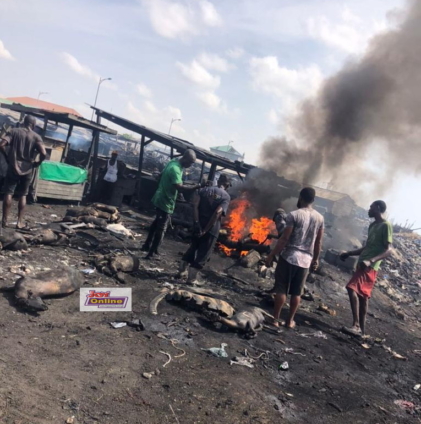At first glance, it may seem like goldsmiths are burning to craft ornaments for sale, but a closer examination of the smoke rising into the atmosphere reveals a troubling reality.
Aside from vehicles emitting fumes, the role of goat roasters in polluting the air is often overlooked. However, residents of Korle-Boode, a suburb in Jamestown, are keenly aware of the devastating impact of these activities on their environment.
While the goat roasters themselves are hesitant to discuss the situation, some residents have bravely shared their concerns about how this pollution is affecting their health.

Sheriff, a native of Korle-Boode, recounts the toll the smoke has taken on him: "I developed an eye problem as a result of the frequent smoke entering my eyes. When I spend time on my phone, tears begin to flow as if I have been physically assaulted. I always carry eye drops with me because if I forget to apply them for a while, the pain and itching worsen."
Despite suffering from these effects, Sheriff feels he has no choice but to endure, as Korle-Boode is his only home.
Other residents also lamented the impact of roasting goat with tyres on their health and their environment.
Theresah, a resident of Korle-Boode, emphasized the dangers of being constantly exposed to the smoke: "Whether you are a schoolgirl or a worker, you inhale smoke wherever you go. I feel the people engaged in this activity have no alternative employment, so no matter the harm it causes them, they will continue because it is their livelihood. I urge the government to find them an alternative location, as we are also suffering."
Nii Okanta 1, a sub-chief of Korle-Boode, shed light on the historical context of the area's activities: "The name 'Boode' means slaughterhouse or abattoir. This activity has been part of our community since I was born. We slaughter and dress animals for sale here. While we are aware that smoking animals is illegal and harmful to the health of our people, we have been promised by the government that they will use taxes collected from the goat roasters to relocate us to a new location and provide gas for smoking the animals. We eagerly await these promises to be fulfilled."
The battle against this silent and invisible enemy in Ghana is a collective responsibility. Through government initiatives and individual actions, there is potential for cleaner air and a healthier environment for all.
Latest Stories
-
Soldier, 2 others in court for alleged robbery
7 minutes -
Telecel reacts to GH¢2 million lawsuit over alleged unauthorized use of Makola woman’s picture
8 minutes -
U.S. government donates 10 liquid oxygen plants to GHS
10 minutes -
33 million posts analysed since 2022 as FIFA marks International Day for Countering Hate Speech
26 minutes -
Delinquency and infraction fees have been there since 2012 – DVLA boss
26 minutes -
Diana Hamilton to walk the runway in debut fashion showcase
28 minutes -
Let’s scrap protocol arrangement – DVLA boss
36 minutes -
Stanchart announces GH₵1.6704 per share dividend for shareholders
56 minutes -
TOR’s revival: Will implementing an OILBOARD initiative the answer?
1 hour -
Kotoko present FA Cup trophy to Life Patron Otumfuo Osei Tutu II
1 hour -
Failure to re-open local bond market, others to weigh on Ghana’s rating – Fitch
1 hour -
FA charge Chelsea’s Mudryk with doping offences
1 hour -
Embrace transformative ESG ambition – KPMG urges businesses
2 hours -
Makola onion seller sues Telecel for GH¢2 million over privacy breach
2 hours -
“I’m not going to cast just because I’m looking for new faces” – Shirley Frimpong-Manso
2 hours

